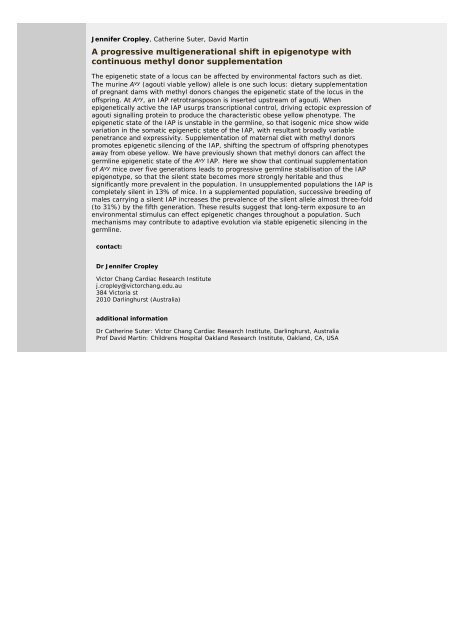Abstracts (poster) - Wissenschaft Online
Abstracts (poster) - Wissenschaft Online
Abstracts (poster) - Wissenschaft Online
You also want an ePaper? Increase the reach of your titles
YUMPU automatically turns print PDFs into web optimized ePapers that Google loves.
Jennifer Cropley, Catherine Suter, David Martin<br />
A progressive multigenerational shift in epigenotype with<br />
continuous methyl donor supplementation<br />
The epigenetic state of a locus can be affected by environmental factors such as diet.<br />
The murine A vy (agouti viable yellow) allele is one such locus: dietary supplementation<br />
of pregnant dams with methyl donors changes the epigenetic state of the locus in the<br />
offspring. At A vy , an IAP retrotransposon is inserted upstream of agouti. When<br />
epigenetically active the IAP usurps transcriptional control, driving ectopic expression of<br />
agouti signalling protein to produce the characteristic obese yellow phenotype. The<br />
epigenetic state of the IAP is unstable in the germline, so that isogenic mice show wide<br />
variation in the somatic epigenetic state of the IAP, with resultant broadly variable<br />
penetrance and expressivity. Supplementation of maternal diet with methyl donors<br />
promotes epigenetic silencing of the IAP, shifting the spectrum of offspring phenotypes<br />
away from obese yellow. We have previously shown that methyl donors can affect the<br />
germline epigenetic state of the A vy IAP. Here we show that continual supplementation<br />
of A vy mice over five generations leads to progressive germline stabilisation of the IAP<br />
epigenotype, so that the silent state becomes more strongly heritable and thus<br />
significantly more prevalent in the population. In unsupplemented populations the IAP is<br />
completely silent in 13% of mice. In a supplemented population, successive breeding of<br />
males carrying a silent IAP increases the prevalence of the silent allele almost three-fold<br />
(to 31%) by the fifth generation. These results suggest that long-term exposure to an<br />
environmental stimulus can effect epigenetic changes throughout a population. Such<br />
mechanisms may contribute to adaptive evolution via stable epigenetic silencing in the<br />
germline.<br />
contact:<br />
Dr Jennifer Cropley<br />
Victor Chang Cardiac Research Institute<br />
j.cropley@victorchang.edu.au<br />
384 Victoria st<br />
2010 Darlinghurst (Australia)<br />
additional information<br />
Dr Catherine Suter: Victor Chang Cardiac Research Institute, Darlinghurst, Australia<br />
Prof David Martin: Childrens Hospital Oakland Research Institute, Oakland, CA, USA

















